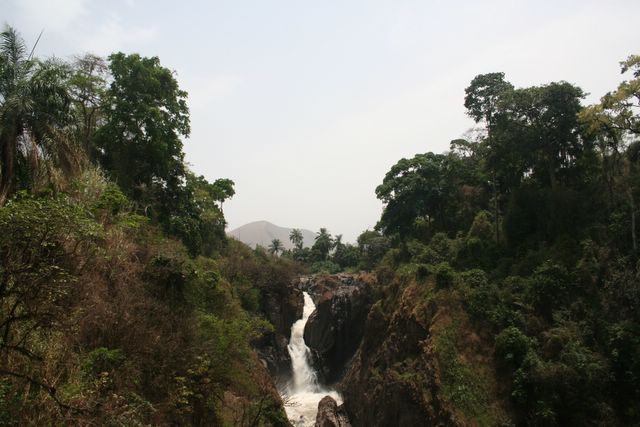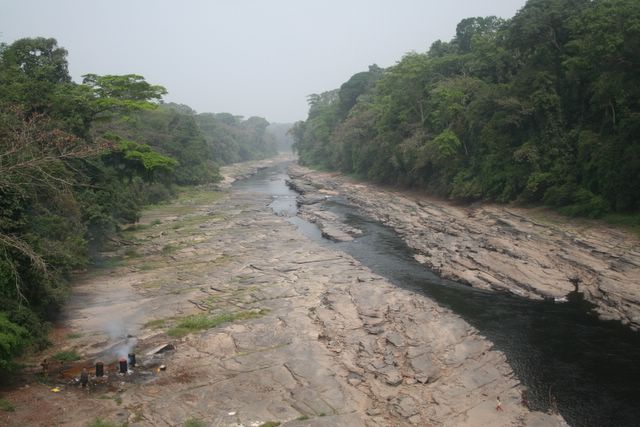update 13.
calamity in cameroon
7 March - 7 April, 2007
Total kilometers cycled: 19,250
Specific country info on routes & roads/food & accommodation/the locals available here.
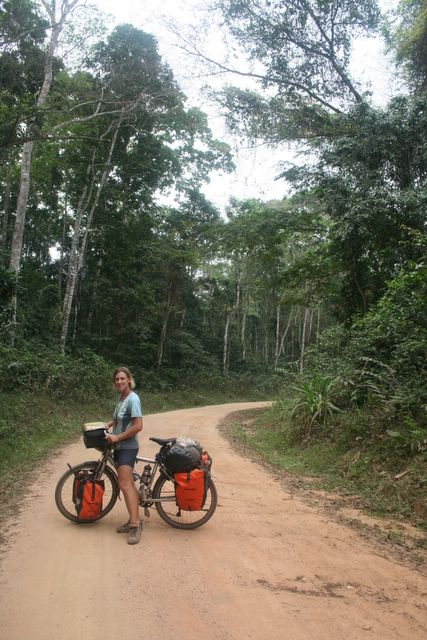 It was with a sigh of relief that we crossed the border into Cameroon.
The last 100 kilometers in Nigeria had been trying and we weary
cyclists were in need of some R&R. Given the often horrific African road conditions, our Kogas have performed
admirably, but after
almost 20,000 kilometers we were bound to have some minor breakdowns.
The derailleur failed us first, and forced Eric to backtrack to
Calabar to hunt down a replacement. Not as easy as it sounds,
since (unusually in Africa) bicycles are a rare sight, After
several hours making the rounds in the market he finally chanced upon a
small shop selling shoddy Chinese made spare parts. The replacement
certainly doesn't compare with the original Shimano XT, but it will do
in a pinch. Next came the chain, which inopportunely snapped
in two on a bumpy track 50 kilometers from the remote Ekang border
crossing. This would have been a routine repair, except that the
tool required to mend or change the chain (a so-called chain-breaker)
also broke. Eric took to pushing and we prayed for a vehicle to
pass. In good time one did, but seeing our desperation the driver
tried to extort the exorbitant sum of $100 USD to transport us to the
next town. Thoroughly disgusted by his opportunism, we continued our
tramp through the jungle. Eventually we were spared a 50 KM
trek by an ingenious villager who deftly repaired the chain using a big
nail and a wrench (or spanner for those of you in the UK ).
It was with a sigh of relief that we crossed the border into Cameroon.
The last 100 kilometers in Nigeria had been trying and we weary
cyclists were in need of some R&R. Given the often horrific African road conditions, our Kogas have performed
admirably, but after
almost 20,000 kilometers we were bound to have some minor breakdowns.
The derailleur failed us first, and forced Eric to backtrack to
Calabar to hunt down a replacement. Not as easy as it sounds,
since (unusually in Africa) bicycles are a rare sight, After
several hours making the rounds in the market he finally chanced upon a
small shop selling shoddy Chinese made spare parts. The replacement
certainly doesn't compare with the original Shimano XT, but it will do
in a pinch. Next came the chain, which inopportunely snapped
in two on a bumpy track 50 kilometers from the remote Ekang border
crossing. This would have been a routine repair, except that the
tool required to mend or change the chain (a so-called chain-breaker)
also broke. Eric took to pushing and we prayed for a vehicle to
pass. In good time one did, but seeing our desperation the driver
tried to extort the exorbitant sum of $100 USD to transport us to the
next town. Thoroughly disgusted by his opportunism, we continued our
tramp through the jungle. Eventually we were spared a 50 KM
trek by an ingenious villager who deftly repaired the chain using a big
nail and a wrench (or spanner for those of you in the UK ). 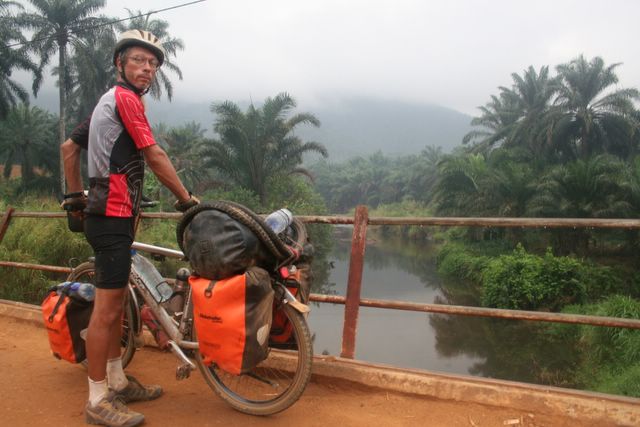 By
the time we reached the border post, we were beat and bedraggled and
hardly in the mood for hassles. The officer on the Nigerian side,
who was obviously bored out of his mind, set off on a tirade as soon as
we presented ourselves in his office. It was unacceptable for
tourists to 'lollygag' about town 'consorting with idlers' before
making themselves known to the proper authorities. After
apologizing profusely for our breach of conduct (we had thought there
would be no harm in drinking a coca-cola before exiting the country) he
seemed to take a liking to us. In the end he was sorry to see us
go and
disappointed that we hadn't taken him up on his offer to camp outside
his office. Our friendly official assured us that we were always
welcome to come back and spend the night on the Nigeria side, where he
could personally ensure our security and comfort .
By
the time we reached the border post, we were beat and bedraggled and
hardly in the mood for hassles. The officer on the Nigerian side,
who was obviously bored out of his mind, set off on a tirade as soon as
we presented ourselves in his office. It was unacceptable for
tourists to 'lollygag' about town 'consorting with idlers' before
making themselves known to the proper authorities. After
apologizing profusely for our breach of conduct (we had thought there
would be no harm in drinking a coca-cola before exiting the country) he
seemed to take a liking to us. In the end he was sorry to see us
go and
disappointed that we hadn't taken him up on his offer to camp outside
his office. Our friendly official assured us that we were always
welcome to come back and spend the night on the Nigeria side, where he
could personally ensure our security and comfort .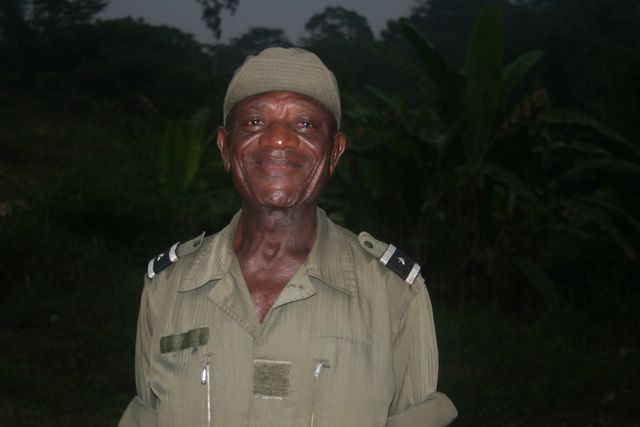
There was a long wait on the other side of the border because the Cameroonian functionary had gone down to the river to bathe. When the officer finally did return he struck us as a jovial type, and although we normally avoid all undue contact with officialdom, we saw no harm in taking him up on his offer to camp. We had a great time 'snapping' the officers, debating the merits of life in Africa versus Europe, gazing at the star-filled sky and even enjoyed a refreshing communal wash in the river. Our stay in Cameroon was off to a good start--too bad our luck didn't hold.
We were riding through unspoiled equatorial rainforest now and were thankful to be tackling the deeply rutted roads during the dry season, before they turned into a river of red-earth. Over the months we had grown used to potholes and sand, washboard corrugations and rocky surfaces that resembled riverbeds. It seemed hardly worth the effort to complain about the state of the road as this was par for the course in Africa. Instead we let ourselves be enveloped by the dense jungle-- the distant bird calls, the gentle trickle of a nearby stream, the incessant whining of insects and the heavy, humid air. The locals were friendly and when we stopped to fill up on water we were offered fresh pineapple and mangoes. Perfect cycling apart from the annoying chants of 'white, white, white' from adults and children alike.
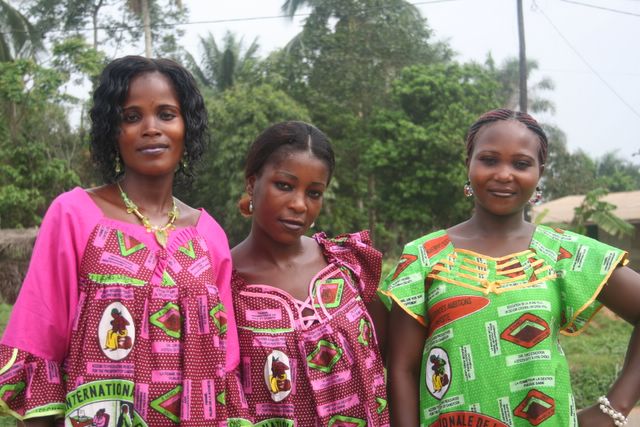 March
8th marks International Womens Day. Largely unnoticed in the
West, this is serious cause for celebration in Cameroon. Throughout the
day local politicians make lofty speeches, all-female teams take
to the field for football matches, and young women in traditional
attire move to the music of their ancestors. At sundown, as the
official festivities wind down, the drinking spots start filling up,
the music starts blaring and the locals get down to the serious
business of getting very drunk. We'd done a fair bit of climbing
on that particular day, had no interest in going on a drinking spree and wanted nothing more than to wash off the
layer of accumulated grime and curl up in bed for a peaceful night's
sleep. Difficult when you're being assaulted from all sides with a
mixture of bad French rap and cheesy love songs being emitted from
man-sized speakers at ear-shattering noise levels. We've also
grown used to noise in Africa, but this was unbearable. Around
midnight Amaya, suffering a severe migraine by this time, lumbered over
to the nearest establishment and pleaded with the proprietor to turn
down the music. He snickered at her request. In
desperation she trotted off to the Catholic Mission Hospital up the
road where an understanding Italian nun accommodated her in a quiet and
spotlessly clean private room. In the morning we set off, Eric
groggy and grumpy and Amaya energetic and refreshed, to face a
demanding 20 KM climb snaking through Cameroon's tropical highlands.
March
8th marks International Womens Day. Largely unnoticed in the
West, this is serious cause for celebration in Cameroon. Throughout the
day local politicians make lofty speeches, all-female teams take
to the field for football matches, and young women in traditional
attire move to the music of their ancestors. At sundown, as the
official festivities wind down, the drinking spots start filling up,
the music starts blaring and the locals get down to the serious
business of getting very drunk. We'd done a fair bit of climbing
on that particular day, had no interest in going on a drinking spree and wanted nothing more than to wash off the
layer of accumulated grime and curl up in bed for a peaceful night's
sleep. Difficult when you're being assaulted from all sides with a
mixture of bad French rap and cheesy love songs being emitted from
man-sized speakers at ear-shattering noise levels. We've also
grown used to noise in Africa, but this was unbearable. Around
midnight Amaya, suffering a severe migraine by this time, lumbered over
to the nearest establishment and pleaded with the proprietor to turn
down the music. He snickered at her request. In
desperation she trotted off to the Catholic Mission Hospital up the
road where an understanding Italian nun accommodated her in a quiet and
spotlessly clean private room. In the morning we set off, Eric
groggy and grumpy and Amaya energetic and refreshed, to face a
demanding 20 KM climb snaking through Cameroon's tropical highlands.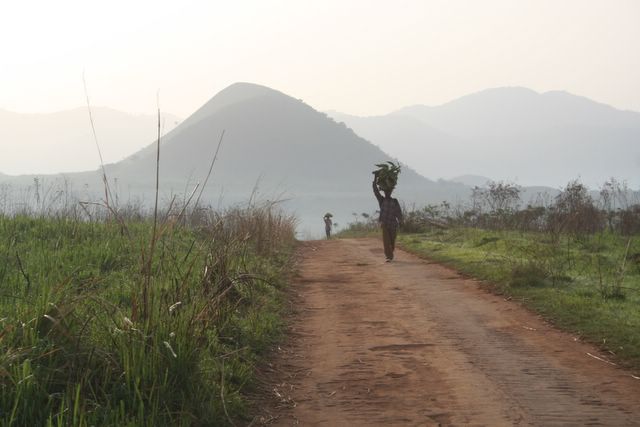 Our
arrival that afternoon in Bamenda coincided with the onset of the
rains. The
wind began to gust and then in quite spectacular fashion, the heavens
opened and we were caught in the deluge. Fortunately, we found
cover before the hail came thundering down, but the temperature
plummeted so quickly we had to dig out our fleece jackets to keep warm.
Everyone was in high spirits and the cool air was a relief after the
hot and sticky weather we had endured. As we rode into town we
spotted the first white person we'd seen since Benin. We couldn't
help staring, just as the villagers do when we enter their settlements.
Our
arrival that afternoon in Bamenda coincided with the onset of the
rains. The
wind began to gust and then in quite spectacular fashion, the heavens
opened and we were caught in the deluge. Fortunately, we found
cover before the hail came thundering down, but the temperature
plummeted so quickly we had to dig out our fleece jackets to keep warm.
Everyone was in high spirits and the cool air was a relief after the
hot and sticky weather we had endured. As we rode into town we
spotted the first white person we'd seen since Benin. We couldn't
help staring, just as the villagers do when we enter their settlements.
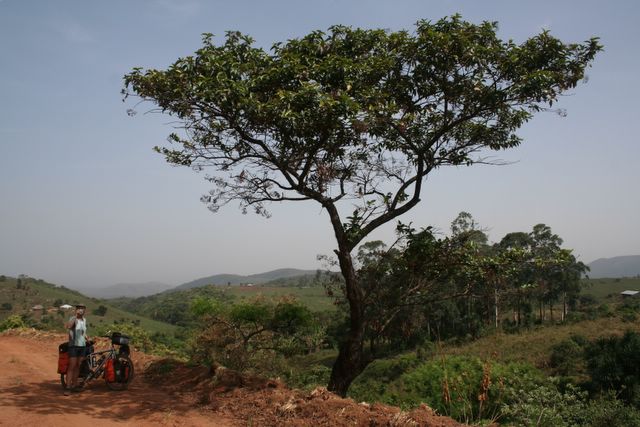 After
treating ourselves to some decent meals and lazing around Bamenda for a
few days, we felt ready to take on the Ring Road, reputed to traverse
some of the finest scenery in all of Africa. We'd been forewarned
of washed-out bridges, impossibly steep climbs and the usual dirt
tracks supposedly impassable in the rainy season. Day one was a
magnificent ride past terraced farmland and verdant rice paddies
with volcanic mountains providing the backdrop. Day two proved to
be one of the most demanding rides to date. Heading out of Wum we
quickly left the rolling meadows behind and the gravel on the narrow
track gave way to large rocks and deep crevices making riding impossible. We resigned ourselves to pushing and
heaved our bikes up the steep inclines, slipping and sliding as we
went. A
After
treating ourselves to some decent meals and lazing around Bamenda for a
few days, we felt ready to take on the Ring Road, reputed to traverse
some of the finest scenery in all of Africa. We'd been forewarned
of washed-out bridges, impossibly steep climbs and the usual dirt
tracks supposedly impassable in the rainy season. Day one was a
magnificent ride past terraced farmland and verdant rice paddies
with volcanic mountains providing the backdrop. Day two proved to
be one of the most demanding rides to date. Heading out of Wum we
quickly left the rolling meadows behind and the gravel on the narrow
track gave way to large rocks and deep crevices making riding impossible. We resigned ourselves to pushing and
heaved our bikes up the steep inclines, slipping and sliding as we
went. A 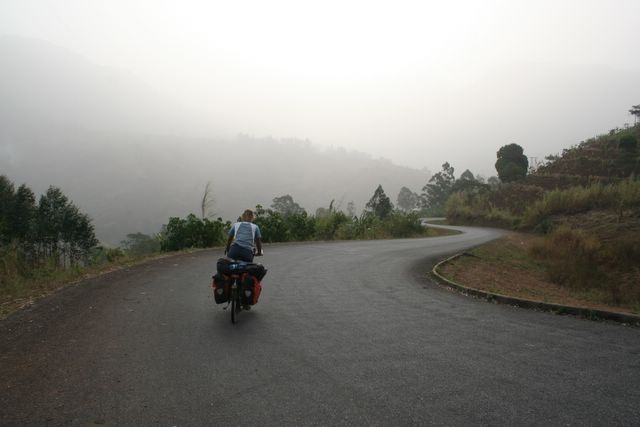 gang
of unkempt children with their pack of scrawny dogs followed
silently behind. Ahead we saw the track winding its way around
the mountainside and then disappearing into the distance. It was
a daunting sight, even more so when a Fulani herder on horseback
galloped by. This was obviously no place for wheeled vehicles.
Nevertheless, we were reluctant to turn back--thus admitting
defeat-- and so we struggled on. It was late afternoon and our arms were
aching before we arrived in Fundong, at an altitude of 1400 meters, just 40 kilometers from our
starting point.
gang
of unkempt children with their pack of scrawny dogs followed
silently behind. Ahead we saw the track winding its way around
the mountainside and then disappearing into the distance. It was
a daunting sight, even more so when a Fulani herder on horseback
galloped by. This was obviously no place for wheeled vehicles.
Nevertheless, we were reluctant to turn back--thus admitting
defeat-- and so we struggled on. It was late afternoon and our arms were
aching before we arrived in Fundong, at an altitude of 1400 meters, just 40 kilometers from our
starting point. Day three of the Ring Road found us back on tarmac and Eric whizzed through the mist and down the mountainside at perilous speeds. Amaya, whose mother was a nurse and fed her a steady diet of gory tales from the emergency room throughout her childhood, clipped along at a more prudent pace. And then suddenly Eric was sprawled out on the pavement, his gear scattered by the roadside and his bike all bent out of shape. Someone had had the bright idea of putting a speed bump at the bottom of a very long and steep hill. This was bad news for unwary cyclists and Eric had been taken by surprise. Almost immediately concerned passers-by pulled over to help. The locals ousted the goats they were transporting in the trunk, loaded Eric and his bike into their car and carted him off for treatment as a nearby Baptist mission hospital.
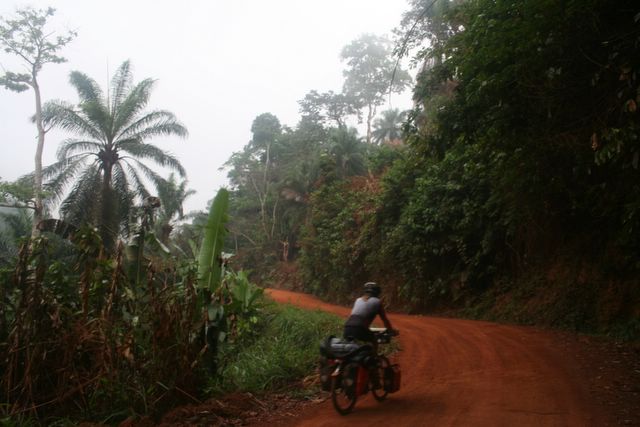
The upshot of this little mishap is that we've had to extend our stay in Cameroon. Eric's got a fractured clavicle and the doctor recommends at least 4 weeks off the bike. We've found a small house to rent here in Bamenda and are passing the days reading novels from the British Council Library, solving Sudoku puzzles, practicing yoga, volunteering at a local NGO and frittering away the rest of the time on the internet. In an effort to keep fit, Amaya has taken up jogging, and most days is followed around the field by a group of giggling school children.
Extending our visas was a taxing experience and a test of our patience and ability to...er...kiss ass. Cameroon was ranked dead last in a recent corruption index. Unless you want to fill the director's car up with petrol or slip a little something extra to the man in charge, playing the obsequious and grateful "whiteman" is the only way to get things done. We were shuffled around from office to office for four days before the pompous officials deigned to give us the magic stamp allowing us to spend 30 more days in Cameroon. You would think the country would be happy to take our 50,000 CFA (100 USD).
So, what's next? We would like to continue down the west coast of Africa through Equatorial Guinea, Gabon and the Congos and then on to Angola, Namibia and finally South Africa. This route will be complicated due to the rains in Gabon, the recent fighting in Kinshasa and the Angolan's unwillingness to grant visas. For now, we're just focusing on rest and recovery, we'll let the future sort itself out later.
contact us at: worldbiking@gmail.com
Support our chosen charity and help educate girls in Africa-more info here
